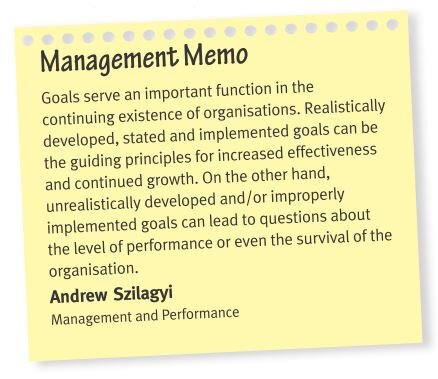How to Set Goals that can be Acheived
About the Authors:
NEIL FLANAGAN and JARVIS FINGER
World-renowned business strategists and authors of several international best-selling books on management. Neil is a sought-after keynote, conference and motivational speaker and Jarvis is the award-winning founder and editor of Australia's best known magazine for school administrators.
Goal setting has been described as 'the inner technology of success' and is one of your organisation's most important activities. Unless taken seriously, this vital planning task will be a futile exercise, an activity that can produce several high-sounding intentions which, for various reasons, are soon forgotten. So, if you want challenging goals that are, importantly, achievable, then you should consider these basic principles…
MAKE SURE YOUR GOALS ARE REALISTIC
A goal that aims too high, or offers a great deal of risk, with little chance of achievement, leads to frustration and surrender. It's easy, for example, to say that a goal for the year is: 'To increase production by 150%''—but quite unrealistic with inadequate resources and uncommitted staff.
KEEP YOUR GOALS SIMPLE
If goals are complex, it is unlikely they will be clear and specific enough to focus effort and marshal the necessary resources. Clear simple goals give your staff an unmistakable vision of what needs to be done.
DEVELOP YOUR GOALS PARTICIPATIVELY
When goals are imposed, rarely does anyone become committed to them. Develop goals with those who will be responsible for achieving them—your staff. The goals become a matter of record and, through personal involvement, everyone will be more motivated to work towards their attainment.
KNOW WHY YOU HAVE SET EACH GOAL
For every goal you set down, ask why you believe that goal is important to the organisation. Be persistent in getting an answer. If reasons don't measure up to your expectations, revise the goal until it warrants inclusion—or get rid of it.
MAKE YOUR GOALS SPECIFIC AND MEASURABLE
Goals should be specific rather than vague, and quantitative rather than qualitative. For example, rather than proposing that you should 'become more visible' around the factory or office, it is much easier to get a handle on such aims as 'I will spend at least one hour a day mixing with staff in the workplace' and 'I will meet weekly with those in positions of responsibility'.
WRITE GOALS WITH ACCOUNTABILITY IN MIND
The successful accomplishment of goals usually depends on someone being held responsible for each goal. This often creates a sense of urgency and purpose, especially when personal reputation or career advancement is involved.
MAKE YOUR GOALS TIMELY
There should be a time dimension that specifies when the goal is to be achieved. Tying a specific deadline to a goal along with individual accountability usually leads to a more proactive approach to its achievement.
WRITE YOUR GOALS DOWN
By committing your goals to paper, and making them public, you not only convert dreams into tangible targets, but also work harder for their achievement—or risk losing face.
ALIGN GOALS WITH THE CORPORATE MISSION
Remember to link individual goals to group goals, which ultimately should be linked to organisational or corporate goals.
REVIEW PROGRESS REGULARLY
Schedule regular meetings to review progress with colleagues. Be honest and forthright in your assessments and don't expect 100 per cent achievement. If you find that a specific goal is unreachable, that it was too ambitious, then modify it to a degree that is attainable. It's a goodidea to set and monitor subgoals as a means of giving an ongoing sense of achievement and keeping people motivated along the way.
MAKE YOUR GOALS CHALLENGING
A goal that is too low, too easily reached, offers little challenge or interest. Add 'stretch' to encourage performance. Striving for our goals takes us out of our comfort zone and causes us to grow with each accomplishment. The best goals are beyond our grasp, but within our reach.
AND REMEMBER ALSO…
Goals should focus not only on ends but also on means.
People can attend to just so many written goals. Don't go overboard.
The total set of goals should be mutually reinforcing—one goal should not have to be achieved at the expense of another.
Face your goals with determination and resolve to never give up. Persistence is important for achievement.
Just about Everything a Manager Needs to Know
By Neil Flanagan and Jarvis Finger













The art of having a difficult conversation is not something that necessarily fits within the Kiwi culture.